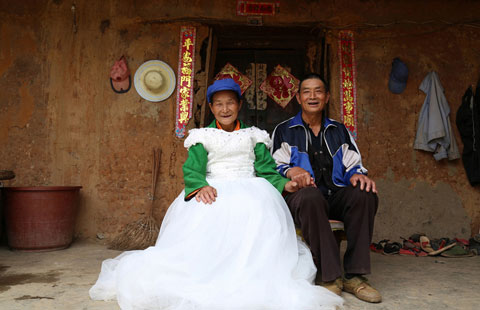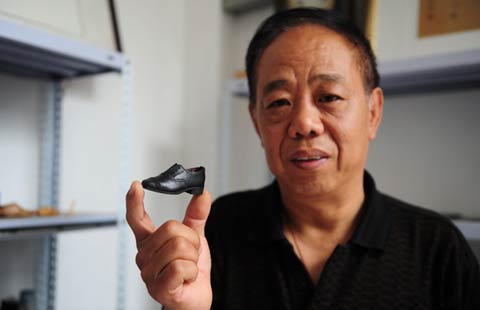
Local authorities in Anji county, Zhejiang province, have proved that it's possible to stimulate and maintain economic growth without endangering the local environment. Yan Yiqi reports from Anji, Zhejiang province.
In the past 100 years, Anji county has been a constant presence on the list of the poorest places in Zhejiang province. In fact, it has probably spent more time on the list than off it.
To improve the local economy, the authorities introduced a number of heavy industries in the 1990s, which rapidly helped the county to lose its "poverty-stricken" label.
However, success was a double-edged sword, and what the county gained in economic strength, it lost in environmental degradation as rivers and water sources became heavily polluted and the air quality plummetted.
By 2003, Anji was once again one of Zhejiang's poorest counties, but this time the economic downturn was cyclical and beyond the control of local decision-makers.
The decline led the county government to make the momentous decision to simultaneously develop the economy and safeguard the environment via a new model, which has resulted in Anji rising rapidly in the financial and "quality of life tables" during the last decade.
Now with bamboo, tea and tourism fast becoming the county's new pillar industries, Anji has successfully been transformed from an underdeveloped county to one of the richest in China's wealthiest province.
In 2014, local government revenue in Anji reached 5 billion yuan ($805 million), a year-on-year rise of more than 18 percent, with the city of Huzhou the best performer. That same year, the county was rated as one of the top five in the province.
As China's first "ecological county", Anji now has a forestry coverage rate of more than 80 percent - the largest in Zhejiang - and the water and air are among the cleanest in the province.
Environmental disaster
Looking at the green trees and clean rivers that abound today, it's hard to imagine that just 12 years ago Anji was a byword for industrial pollution as a result of the dye works, paper mills, cement factories, quarries and other high-polluting industries that had been introduced to boost the local economy.
Pan Wenge, director of the Yucun Village Administrative Committee, remembers how the environment was destroyed by pollution caused by the quarries that were first put into operation in the 1980s. At the peak, 65 trucks were in constant use, carrying tons of stone out of the village day and night.
"Quarrying used to be a pillar industry of the village. Smoke and dust filled the air, while the leaves of the trees were covered with thick layers of dust. Our furniture was always covered with dust, even though we never opened the windows" Pan said, adding that the dust also turned the hills from green to yellow as the local bamboo plants and a wide range of trees died.
"When I was a child, the village was surrounded by fruit trees, such as peach, pear and plum, but their fruit was no longer harvested in the 1990s," he said.
The dust was also dangerous to human health, and many villagers contracted pneumoconiosis.
Yucun resident Hu Jiaxing said he remembers that many of the villagers, some only in their 40s, were incapable of walking up a very slight incline.
"We were not aware of the disease back then," he said.
Pan said about 50 percent of Yucun's residents relied on quarrying, an industry that made many locals very wealthy. In 2003, annual per capita income in the village exceeded 7,000 yuan, making Yucun the richest in Anji, albeit against little competition.
However, the situation in the village was a microcosm of China - after two decades of developing high-polluting industries, it had become wealthy and powerful, but the environment had been destroyed.
Decline and rise
In 2003, the local authorities decided to develop the county via an ecological growth model, not an economic one.
Despite the recent success, Shan Jinyan, the Party chief of Anji, said maintaining the development model has been tough.
"Ten years ago, if anyone had asked me if I was confident about taking this path, my answer would have been 'no', because we had been experiencing a very difficult time, especially in terms of economic development."
To give priority to ecological development, the authorities closed 33 quarries, cement factories, and paper mills, industries that generated about one-third of the county's annual tax revenue.
After the closures, Anji's economic performance plummetted, with Huzhou occupying the bottom rung on the county's wealth ladder for six consecutive years.
Meanwhile, in Yucun, annual revenue declined to 200,000 yuan in 2004 from 3 million yuan the previous year.
Both Pan and Hu said they both harbored doubts about the decision to close the pillar industries, and for Pan those feelings were magnified when disgruntled villagers called at his home to express their dissatisfaction.
"The only thing I could do was to promise them that a better environment would mean they would earn much more money eventually," he said.
The entire county was hit by the economic downturn, and for Shan the hardest times came in 2007 and 2008, when he had to borrow money from Huzhou to pay the salaries of local civil servants.
"However, our recent success proves that the pain we encountered during those years was worth it," he said.
To encourage all level of governments to stick to the ecological development path, Anji provides different focuses for its townships, and unlike places where government efficiency is evaluated by a unified set of economic growth standards, the county uses specific standards to measure the performances of different towns with different focuses.
In Anji, six townships are exempt from evaluation by economic standards such as annual revenue and inbound investment. "Instead, we evaluate them via environmental criteria such as water and air quality," Shan said, adding that even in townships focused on industrial development, there is no room for investments that could damage the environment.
"In 2005, we turned down an 8 billion yuan papermaking project because it did not meet our environmental evaluation standards," he said.
Incomes soar
Zhang Heying, a resident of Shanchuan township, said she only recently realized that a good environment can be a money spinner.
The former textile factory worker is now a cook at a guesthouse in her hometown. In addition to her wages, she sells homegrown fruit and vegetables to tourists, and her annual income has now reached 50,000 yuan, far more than she could earn at her former job in the factory.
"I can see that Anji's clean environment is attracting an increasing number of tourists from the big cities, so I plan to open my own guesthouse this year," she said.
Ecological tourism is now an important industry in Anji, attracting more than 12 million tourists last year and generating revenue of 12.75 billion yuan.
Yucun, once heavily polluted, is now a tourism hot spot, and by the end of last year, the village had three tourist attractions, while 14 guesthouses provided a total of 410 beds. The village had revenue of 188 million yuan, while per capita income had risen to 27,677 yuan, a far cry from the mere 7,576 yuan recorded in 2004, mainly thanks to the new pillar industries: agricultural, bamboo, and culture.
Shan said that in addition to the sustainable growth brought by the ecological development model, the people of Anji have become increasingly aware of the value of maintaining and protecting their clean, livable environment.
"No one in Anji would sit back if they saw pollution taking place because they now realize that they can rely on the improved environment," he said. "I think this raised awareness is much more important than economic development."
Contact the writer at yanyiqi@chinadaily.com.cn

|
A bird's-eye view of Yucun village in Anji county, Zhejiang province. After the authorities closed down polluting factories, the village has been transformed into an ecological tourism hot spot after the local authorities closed down a number of polluting factories. Provided to China Daily |
|
A tea garden and resort hotel set among Anji's mountains are some of the area's major new attractions for visitors and investors. Gao Erqiang / China Daily |
|
Before 2003, the environment in Yucun village in Anji was ruined by quarries and cement factories. Provided to China Daily |
(China Daily 05/28/2015 page5)








